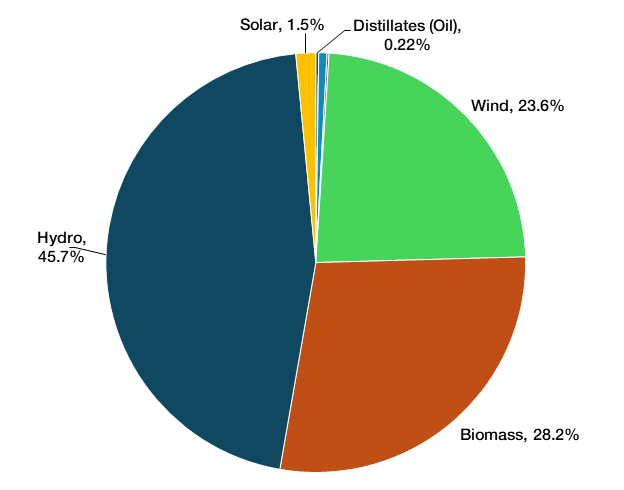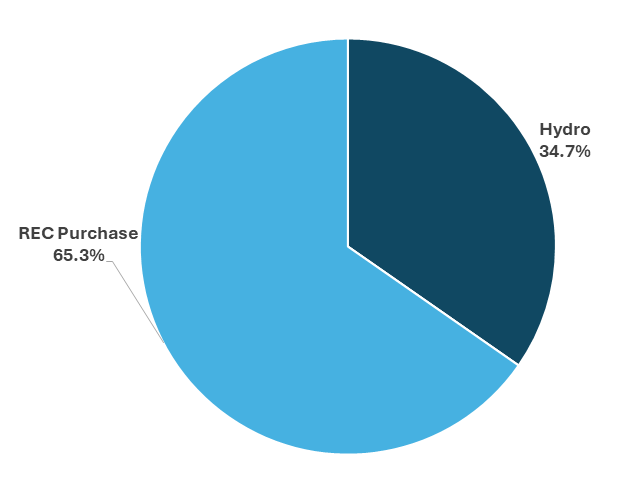Our Energy Portfolio
The table below shows the resources that provided BED’s energy supply in 2023.
BED Energy Supply, January-December 2023
| Winter Peak MW | 52.5 | ||||
| Summer Peak MW | 63.8 | ||||
| Energy Use (MWH) | 327,967 | ||||
| Resource | Fuel Type | Location | Capacity (MW) | Energy (MWH) | |
| McNeil | Wood | Vermont | 25.0 | 92,399 | |
| Hancock | Wind | Maine | 13.5 | 29,479 | |
| Sheffield | Wind | Vermont | 16.0 | 24,177 | |
| Georgia Mountain Community | Wind | Vermont | 10.0 | 23,615 | |
| Hydro-Québec | Large Hydro | Quebec | n/a | 52,416 | |
| NYPA | Large Hydro | New York | 2.6 | 17,592 | |
| Winooski One | Small Hydro | Vermont | 7.4 | 36,180 | |
| Great River Hydro | Small Hydro | Vermont | n/a | 43,800 | |
| Burlington | Solar | Vermont | 3.4 | 4,981 | |
| BED Gas Turbine | Oil | Vermont | 22.0 | 472 | |
| ISO New England Exchange – Net | Various (system mix) | New England | n/a | 2,855 | |
| Total Gross Generation & Purchases | 325,112 |
BED Fuel Types and Renewability
2023 Sources Prior to Renewable Attribute REC Sales and Purchases
BED sources the energy required to cover its annual sales plus an additional amount to account for electricity used by BED’s own facilities and the line losses incurred on the transmission and distribution systems (this accounts for an addition of approximately 3% above annual sales). Many generating resources are inherently variable, so the amount of production in any year will fluctuate. For CY2023, BED’s renewable resources provided over 100% of BED Sales.
2023 BED Energy Supply
Prior to REC Transactions

NOTES: BED has no contracts for resources fueled by Natural Gas, Nuclear or Coal. 0.2% of generated energy comes from Oil used at the BED Gas Turbine. The above represents energy generated and purchased by BED prior to REC sales and amounts to 325,112 MWh of electricity. The chart does not represent an ability to claim those fuel types for renewability.
After Accounting for Renewable Attribute REC Sales and Purchases
In order to verify that its energy portfolio is 100% renewable under Vermont’s Renewable Energy Standard (RES), each year BED must retire Renewable Energy Credits (RECs) equivalent to its annual sales from generators qualified by the State of Vermont. BED receives RECs for each MWh of renewable energy that BED generates or purchases under its contracts. Sales of RECs are allowed under BED’s integrated resource plan and help BED control the rate impacts of purchasing newer renewable resources (which are generally more expensive than older renewable resources or non-renewable alternatives). BED sells some of its higher-value RECs from its owned or contracted sources and purchases lower-value RECs from the renewable resource market for RES compliance purposes, and to maintain an energy portfolio that is 100 percent renewably sourced. In CY2023 BED sold RECs representing approximately 210,000 MWh of generation and received revenues of approximately $6.8 million – equal to over 13% of its cost of service. BED purchased and retired Vermont qualified RECs to replace the RECS sold. For 2023, BED reserved/retired 328,144 RECs from hydroelectric resources, approximately 7,000 RECs in excess of its 2023 sales of 321,988 MWh. BED voluntarily retires RECs in excess of its sales to customers in order to account for energy lost in the distribution and transmission of power to customers along with energy used by BED itself for its facilities and electric vehicle fleet.
2023 BED Renewability After REC Transactions

The following table represents the emission profile of the RECs that BED retired for 2023 as tracked by the New England Power Pool Generator Information System (note “-“ represents a zero value as for 2023 all RECs retired were from hydroelectric plants).
| Carbon Dioxide | Carbon Monoxide | Mercury | Nitrogen Oxide | Organic Compounds | Particulates | Particulates (<10 microns) | Sulphur Dioxides | |
|---|---|---|---|---|---|---|---|---|
| Renewability lbs. per MWh |
– | – | – | – | – | – | – | – |
